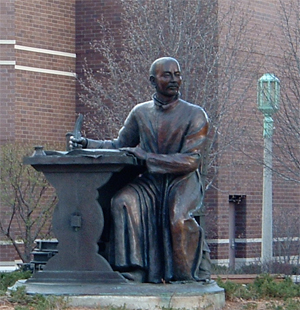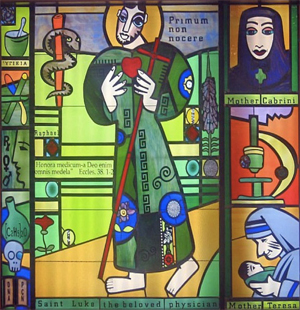
|
|
Catholic faith is not Catholic culture, |
|
Cultural Research
Activities and Ways of Proceeding
The starting point for the work of the Catholic Education Institute is the large change that has come about in the Catholic Church in the United States as a result of the paucity of women choosing to enter religious life. For a century and a half religious sisters were leaders in nurturing and modifying Catholic culture in Catholic schools, parishes, and healthcare facilities. At any given time in the United States prior to 1990 they outnumbered priests by about three to one. Pastors relied on them to staff schools and run religious educations programs, nuns promoted vocations to the priesthood as well as to their own sisterhoods, and they had an enormous impact on Catholic healthcare in the United States.
The Catholic Education Institute works to strengthen the emerging model that must replace a waning powerhouse of Catholic culture. In particular, the Catholic Education Institute seeks ways to renew Catholic culture without the assistance of the large numbers of Catholic sisters who made the work of the Church their primary life’s work. To be sure, many Catholic laywomen and men now play vital roles in the church in the United States. So, in one sense, the Church in the United States has already transitioned from a culture predominantly sustained, nourished, and transmitted by nuns to one that relies on the dedication and service of dedicated Catholic laywomen and men. Nevertheless, there are some inherent problems with the current situation.
Currently Catholic culture is at serious risk of erosion because
the church has not yet developed a way to provide adequately for the religious
training of laypeople. The Church in
the United States still relies on the cultural legacy of religious sisters
which is dimming over time. It has
failed to develop a new system that generates well-trained laypeople with their
own secular expertise who are committed to and well-formed in their Catholic
faith and practices. Nuns received
extensive religious formation in their motherhouses and the process of
formation. For each religious sister
this training took place over many years.
As a result, their practical religious formation was akin to the
academic training that priests received through the seminary system.
Lay ecclesial ministers do receiving training. However, things are quite different for
faculty and administrators at Catholic schools, colleges, and universities and
for physicians, nurses, and administrators working in Catholic health
care. While all of these men and women
receive expert training in their secular discipline, they receive very little
formal religious instruction or practical religious training. Some are well informed and trained in
Catholic matters, but in most cases this is a result of being raised in a
strong Catholic family.
Given the context outlined above, the Catholic Education Institute does essentially three things:
1. It educates and forms educators, administrators, trustees, and lay ecclesial ministers. It does this by running seminars and developing books with resource materials.
2. It analyzes Catholic culture in various Catholic institutions (universities, high schools, grade schools, parishes, and healthcare institutions) and makes recommendations for strengthening Catholic culture.
3. It develops programs for schools, parishes, and hospitals to assess Catholic knowledge, practices, and faith commitment.
In carrying out the three classes of activities indicated above, the Catholic Education Institute adheres to two ways of proceeding:
A. In addition to relying on data provided by the Catholic institution itself, whenever feasible, the Catholic Education Institute meets with and interviews representatives from various groups. This provides qualitative data that is of great benefit in analyzing the particular Catholic culture and institution being analyzed.
B. When recommending changes, the Catholic Education Institute emphasizes optional Catholic programs that people in the institution (university, high school, grade school, parish, or healthcare facility) can choose to join. Rarely does the Catholic Education Institute recommend requiring participation in particular Catholic programs for all members of an institution.
In all of its endeavors, the Catholic Education Institute operates from a particular perspective about how culture changes and develops. Individual practices drive cultural change in organizations. But practices are not stand-alone activities. Practices must operate along with essential components: narratives, norms, and benefits. In order for a practice to have a cultural impact, it must be plausibly justified by a short narrative that explains why the practice makes sense both in the Catholic culture and in the larger culture, a norm that defines how frequently and carefully the practice should be performed, and some benefit that accrues to the individual as well as to the organization as a result of performing the practice regularly and well.

